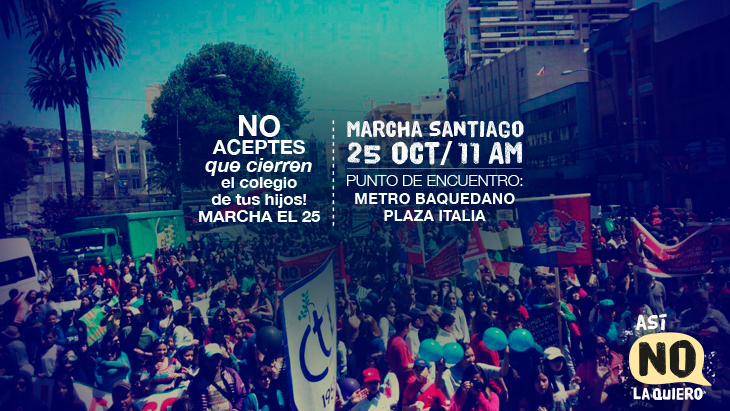
EspañolA mass demonstration took place in Santiago, Chile, on Saturday, against the education reform proposed by the ruling New Majority (NM) coalition. Demonstrators rallied around the slogan #LaMarchaDeLosPapas (the parents’ march).
The policy in contention seeks to end profits in accredited educational institutions, subsidies for private high schools, and admissions selectivity. At this stage, the reform has the support of the Socialist, Christian Democrat, and Communist parties of Chile.
The protest was led by the Not Like This movement, which brought together various family and parent organizations, including the Confederation of Parents and Guardians of Subsidized Charter Schools (CONFEPA).
Protestors claimed that the pending reform fails to take their opinions into account, and that approval would have a negative impact on the lives of their children.
According to event organizers, 200,000 individuals attended, although Chilean police placed their count at 30,000. In addition to a heavy turnout by Chileans living in Santiago, the demonstration attracted protestors from the more remote regions of Maule, Valparaíso, Biobío, and La Araucanía.
Two bulldozers were part of the march, alongside several coffins, representing the death of subsidized or charter schools. In the words of CONFEPA Spokesman Erika Muñoz, the bulldozers were “to demonstrate what this government came to do.” The protestors maintained their right to freely choose their childrens’ schools, and denounced the loss of options precipitated by the reform.
La retroexcavadora del @GobiernodeChile q quiere terminar con la educación particular subvencionada @senadorquintana pic.twitter.com/PbbeHAwiNk
— Por Mis Hijos (@pormishijostodo) October 25, 2014
“My dad already chose my school; why do I have to change now?” read one of the banners carried by protestors, most of which targeted NM-coalition senators. If the education reform becomes law, more than 4,000 Chilean schools that receive state funding will have to close or become fully independent institutions — which entails the likely relocation of almost 200,000 students.
Francisco Sánchez, a researcher at the Foundation for Progress, explained to the PanAm Post that the NM coalition has secured enough votes in both houses of the Chilean Congress to pass the reform: “It will most likely become law. It’s one of the symbolic promises of the presidential campaign, for which the political cost is nonexistent given that the population is not aware of the problems with education reform.”
University of Chile School of Government and Political Science Professor Felipe Muñizaga, however, pointed out that the reform could stress relations between the ruling Socialist Party and the Christian Democrats, who remain a key part of their electorate: “The NM must maintain a political balance between its two parent-parties. The Christian Democrats are advocates of religious schools, and the party risks muddling its own electorate by moving against subsidized charter schools with leftist policy.”
If the reform is successful [the government] will have secured a socialist-oriented political and cultural hegemony.
For Muñizaga, the NM has decided to accept necessary costs when it comes to political reforms: “In other words, the government is assuming high political costs now because it knows that if the reform is successful it will have secured a socialist-oriented political and cultural hegemony in the medium and long run.”
To comply with the law within the allotted two-year adjustment period, subsidized schools that opt towards the private sector will need to become a form of nonprofit foundation or “educational corporation.” The latter is a new and less bureaucratic category for when two or more people form a nonprofit private entity to administer a school.
In addition, the student selection process will then be verified by the Chilean Government: “The application will be managed through a single platform that will contain all information relative to educational establishments,” reads Article Two of the reform.
This reform seeks to push out for-profit entities from the Chilean education system, and Muñizaga says that Chilean progressives have done a great job of destroying the values and principles that a free society should maintain: “They have decided to denounce any failure or shortcoming that the private sector experiences — especially within the realm of education — as a way to demonstrate the failures of the ‘neoliberal model.'”
For now, quality of education has been left out of the reform debate, but the Chilean Congress will soon work to adjust the qualifications necessary to become a teacher. Sánchez of the Foundation for Progress explains that “As before, we are now seeing large-scale state interference in the education system, which in one way or another will establish a homogenizing education culture at the expense of individual freedom and responsibility.”
Among the proposed adjustments for prospective teachers are an increase in entry requirements, a mixed evaluation system — one centralized to certify knowledge and skills, and one decentralized to evaluate classroom performance — and greater autonomy for principals to manage their establishments.
Translated by Peter Sacco. Edited by Fergus Hodgson.
 Versión Español
Versión Español












